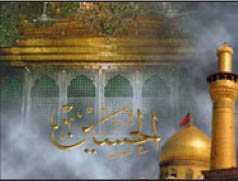IECRC Observes Ashura
in Bay Area
 The
Islamic Educational & Cultural Research Center observed
the momentous occasion of Ashura in three different locations
in Northern California on the 10th, 11th, and 12th of Muharram
in the cities of San Jose, Hayward, and Fremont, respectively.
The month of Muharram marks the beginning of the twelve-month
Islamic lunar calendar.
The
Islamic Educational & Cultural Research Center observed
the momentous occasion of Ashura in three different locations
in Northern California on the 10th, 11th, and 12th of Muharram
in the cities of San Jose, Hayward, and Fremont, respectively.
The month of Muharram marks the beginning of the twelve-month
Islamic lunar calendar.
In the Islamic tradition, the number of months is twelve,
four of them being sacred [Al-Quran, 9:36]. Muharram is
one of the four months, and Ashura being the 10th of Muharram
holds tremendous significance. Hazrat Shaykh Abdul Qadir
Jilani (may Allah be pleased with him), the 11th century
CE scholar and Sufi saint of Iraq, and fountainhead of the
Qadri Spiritual Order, relates a saying of the Holy Prophet
(Peace Be Upon Him) in his magnum opus “Al-Ghunya”,
that this is the day on which Allah Almighty created the
heavens and the earth; it is the day on which great prophets
such as Adam, Abraham, and Jesus (peace be upon them all)
were born, and it is also the day on which some of them
were delivered from their enemies, such as Prophet Moses
(peace be upon him) from the Pharaoh.
However, the most significant event that took place on the
day of Ashura in the eyes of Muslims is the martyrdom of
the very dear and beloved grandson of the Holy Prophet Muhammad
(Peace Be Upon Him) at the hands of the tyrant Yazid, the
then governor of Syria. The San Jose Ashura gathering featured
Dr. Mohammad Ahmed Qadri, founder of IECRC, who delivered
a very educative and moving speech via telephone recounting
the reasons that led to this sad, and yet pre-destined occurrence
that epitomizes sacrifice in the struggle for upholding
the truth.
Dr. Qadri explained that the episode at Karbala (in Iraq)
was that of love, betrayal, and steadfastness on the path
of truth. Yazid, the son of Amir Mu’awiyah (may Allah
be pleased with him) had taken up the leadership of Kufa
(in Iraq) and was demanding allegiance from Hazrat Imam
Husayn (may Allah be pleased with him), the blessed grandson
of the Holy Prophet Muhammad (Peace Be Upon Him). Yazid
was a blatant and blasphemous transgressor of the Shari’ah
(Islamic Law). He had tied horses to the blessed Mosque
of the Holy Prophet (Peace Be Upon Him), and they had soiled
its sanctified precincts. The people of Kufa were terribly
dissatisfied with Yazid and begged and pleaded with Hazrat
Imam Husayn (may Allah be pleased with him), who was resident
in Mecca, to come and relieve them from Yazid’s tyranny
and wrongdoings.
They sent bagful of letters making their case asking Hazrat
Imam Husayn (may Allah be pleased with him) to come to Kufa
and take over from Yazid, promising their allegiance to
the Imam. After assessing the situation and its direness,
Hazrat Imam Husayn (may Allah be pleased with him)eventually
decided to leave Mecca with his family to heed the desperate
call of the people of Kufa. However, upon the Imam’s
arrival, the Kufis turned back on their word falling prey
to pressure from Yazid. Hazrat Imam Husayn (may Allah be
pleased with him) tried to reason with the Kufis, reminding
them of their letters inviting him, asking of them what
he had done to them that had made them thirsty of his blood,
reminding them that he was the grandson of the Holy Prophet
(Peace Be Upon Him) and son of Hazrat Ali (may Allah ennoble
his countenance). However, all this fell on deaf ears and
Yazid’s army of 22,000 began to lay siege to the 72
members of Hazrat Imam Husayn’s group (may Allah be
pleased with all the martyrs).
They were cut off from the river Farat at the banks of which
the battle took place in the city of Karbala. The 72 unarmed
and unprepared men, women and children were made the target
of barrage of arrows. However, they put up a brave fight
in which hundreds of Yazidis were also killed. The massacre
climaxed in the martyrdom of Hazrat Imam Husayn (may Allah
be pleased with him) at the hands of the enemy.
IECRC’s observance
of this sad and historic event also took place in Hayward
where poignant couplets reminiscing and informing the young
generation of this significant turning point in Islamic
history were recited. They were reminded not o take Islam
for granted as it has reached us through the sacrifices
of our great ancestors such as Hazrat Imam Husayn (may Allah
be pleased with him) who gave up his life but did not give
in to the hands of a wrongdoer.
The same spirit was echoed at IECRC’s Fremont gathering
at the Munoz Hall, where Maulana Ramzan of the Bayview mosque
of San Francisco eloquently expressed in the words of Hazrat
Khwaja Muinuddin Chishti (may Allah have mercy on him),
the 12th century CE Sufi Saint of India who wrote the following
Persian lines in praise of Hazrat Imam Husayn (may Allah
be pleased with him):
Shah ast Husayn baad Shah ast Husayn
Deen ast Husayn Deen panaa ast Husayn
Sar daad na daad dast dar dast-e-Yazid
Haqqa ke bina-e laa ilahaa ast Husayn
-------------------------------------------------------------------------------------

